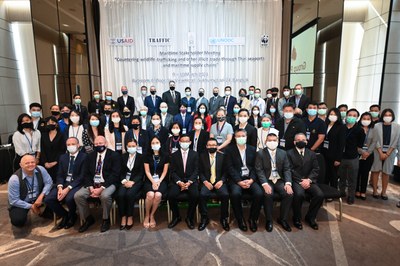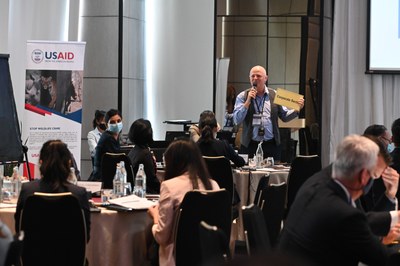Thai Maritime Stakeholders Join Forces in Tackling the Illegal Wildlife Trade
The workshop, organized by Thai Customs, the United Nations Office on Drugs and Crime (UNODC), United States Agency for International Development (USAID) Wildlife Asia, TRAFFIC and WWF took place in Bangkok March 9-10, 2021. The event brought together 33 organizations: representatives from nine government departments (including the Thai Customs, environmental police and Convention on International Trade in Endangered Species of Wild Fauna and Flora (CITES) management authority), 14 development partners and 10 private sector entities, mainly from shipping and freight companies.
“Governments cannot win this battle alone. Public-private partnerships are the only way to seriously tackle the traffickers that move wildlife products across borders and jurisdictions,” said Chaiyut Kumkun, Principal Advisor on Customs Control Development for Director-General of Thai Customs.
The workshop focused on deepening the participants' understanding of the risks wildlife trafficking presents to maritime supply chains and their operators; sharing best practices and identifying interventions which will address existing gaps in systems and processes that are exposing the industry to transnational traffickers’ nefarious operations. Information sharing, cargo risk assessment, shipper due diligence, and legislation were some of the priority areas identified that will guide strategic action to tackle the illicit trade in the maritime supply chain.
"With diverse fields of expertise in the room, everyone's contribution has been extremely insightful to understanding challenges and opportunities to identify anti-trafficking solutions for all sectors," said Anat Machima, Chief Operating Officer, Hutchison Ports Thailand and Chairman of the Thai International Cargo and Container Terminals Association.
“This constructive multi-stakeholder event is a meaningful contribution to the efforts of the Thai government in leveraging the seriousness of the issue across all the sectors involved and vulnerable to this illicit business,” said Pimpavadee Phaholyothin, Chief Executive Officer, WWF-Thailand.
 Due to its rich biodiversity, cultural beliefs, and modern transport infrastructures, Thailand plays an important role as source, transit and consumer country for a wide range of protected plant and animal species. Home of the endangered Siamese rosewood, illegal shipments of this highly prized timber used for high-end furniture in East Asia continue to be intercepted at the ports on their way out of the country. In 2015, over 10 tons of African elephant ivory were seized in a containerized cargo that used Thailand as a transit point. With the aviation sector disrupted and national borders still closed due to the COVID-19 pandemic, it is predicted that traffickers will increasingly shift to maritime shipments, therefore enhanced vigilance should be exercised.
Due to its rich biodiversity, cultural beliefs, and modern transport infrastructures, Thailand plays an important role as source, transit and consumer country for a wide range of protected plant and animal species. Home of the endangered Siamese rosewood, illegal shipments of this highly prized timber used for high-end furniture in East Asia continue to be intercepted at the ports on their way out of the country. In 2015, over 10 tons of African elephant ivory were seized in a containerized cargo that used Thailand as a transit point. With the aviation sector disrupted and national borders still closed due to the COVID-19 pandemic, it is predicted that traffickers will increasingly shift to maritime shipments, therefore enhanced vigilance should be exercised.
“The maritime supply chain is at the center of the wildlife trafficking issue, as organized criminal groups exploit any crack in the system to conduct successfully their criminal operations. They look for a crack and if they don’t find one, they create it, through deception, fraud and corruption”.
"It takes a network to dismantle a network, and with this workshop we took a big step forward in that direction," said Monica Zavagli, TRAFFIC Program Manager.
The workshop in Thailand was the first of its kind for Southeast Asia. Similar events aimed at tackling wildlife trafficking at ports and along international maritime supply chains took place in African countries 2019 in Tanzania and Kenya, with more workshops planned in other high-risk countries in the near future.


